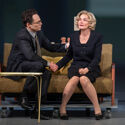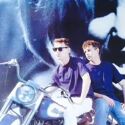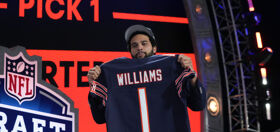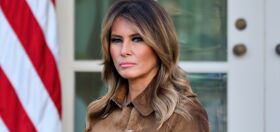Sweden’s rapidly making up for ABBA and other lackluster musical acts. The Nordic country’s brought us many an aural favorite, such as soft-voiced El Perro del Mar, the playful Suburban Kids With Biblical Names and, yes, lovesick Jens Lekman.
Above you’ll see Lekman singing “I’m Lost,” which happens to have been written by Arthur Russell, who we featured last week.
Of course, Lekman’s more than a cover artist – and he’s got a new album to prove it. In celebration of the 25-year old’s fresh full-length, Night Falls Over Kortedala: A Collection of Recordings from 2004-2007, we dispatched Queerty contributor Joey Hood for a little heart-to-heart. Read the results, after the jump…
Joey Hood: Night Falls Over Kortedala’s standout track “A Postcard to Nina” features overtly queer lyrics with you moonlighting as a pen pal lesbian’s boyfriend under her clueless father’s nose. Is there a kernel of truth to this song?
Jens Lekman: Yeah, it actually happened.
JH: Has “Nina” actually heard the song? If so, what was her reaction?
How about we take this to the next level?
Our newsletter is like a refreshing cocktail (or mocktail) of LGBTQ+ entertainment and pop culture, served up with a side of eye-candy.
JL: She loved it. Her dad also heard the song. We’re still in contact and still friends.
JH: The full title of this album is Night Falls Over Kortedala: A Collection of Recordings from 2004-2007. How did you go about choosing songs for this album?
JL: I’ve never been able to put together an album. I had a bunch of my friends take care of that. I gave them about 30 songs and they had a contest. They would call me up and say, “Song No. 8? Ten points.” They would listen to the songs for a couple of days and just call me up. We, of course, had ideals of what the record would be.
JH: Is there a certain track that you like the best?
JL: Actually, when I finished the record, I fell in love with the last song, “Friday Night at the Drive-In Bingo.” When I wrote that – well, I think of myself as an entertainer. My songs are very personal, but at the same time, I want to entertain people. So I write quite silly songs sometimes, because I want to make people smile. “Friday Night at the Drive-In Bingo” literally had a very specific meaning to me when I wrote it. But at the end, it’s got a soul somehow. I realize that I like silly songs much more than serious songs. But “Friday Night” reminds me of innocence.
JH: I’ve noticed that some indie music journalists label your sound as “twee-pop.” From what I’ve read, that label irritates a lot of musicians.
JL: In a way, I think it’s kind of nice. A few years ago, everyone I knew was listening to twee-pop and then got into other types of music. They then refused to admit that they ever listened to twee-pop. At that point, I felt like that maybe I shouldn’t call myself “twee-pop.” It’s quite a weird label, I guess.
JH: I also wanted to talk about your voice. It seems as if you have a very limited vocal range. I was wondering the case with songs that you write that happen to fall outside of your vocal range.
JL: I would probably get someone in the studio to sing with me, I guess. I had El Perro Del Mar on the record. She sort of covered the parts that I couldn’t do. El Perro Del Mar definitely inspired me. She sings really clean and has a professional voice. But there’s something else that she does with her voice. Sometimes, she sounds like a sad little kid with her voice.
JH: I wanted to talk about the song “Into Eternity” – there’s this ostinato piano melody that just unfurls into a thing of beauty. It’s almost miraculous in a way. How did the piano melody come about?
JL: Well, the lyrics I wrote a long time ago. The lyrics were just sitting around, waiting for a sound. I used to play “Into Eternity” on just piano or guitar, but it sounded too sentimental. I think that all the percussion, especially the accordion; I think gave it a range there.
JH: A lot of the song topics for this album are all over the place from avocados to asthma inhalers. How do you find such esoteric lyrical ideas?
JL: My songs actually sort of write themselves. It’s almost like I shouldn’t take credit for my own songs. Usually, they just happen and I go, ‘Oh, that’s a song.’ Particular songs, such as “Your Arms Around Me” or “A Postcard to Nina,” happened in like an hour or two. But in a lot of cases, I almost write prophetically. I would write about something happening that hasn’t happened yet. It’s almost like that I would make it happen.
JH: Your lyrics are also highly regarded for their wit. Do you have any comedic writers that you admire?
JL: I’ve always watched a lot of comedy. I’ve always loved stand-up comedy and all of that. I don’t know much about it, but it’s definitely been an inspiration in some terms. I didn’t get to do much of that on this record, but it’s something that I really find interesting. I want to write more dialogue. I’ve always wanted the characters in the songs to come alive.




















Michael
Your Abba dis proves how little you know, how terribly sad. Mouth agape. Shocked. Pretty much every songwriter and producer during the years of Benny/Bjorn and more so since understand the genius of Abba. It’s about math, engineering, and things you don’t understand.
Also do you not even know about The Knife, Robyn, Radio Dept., Jose Gonzales (probably since he’s cute), or we can step over to Norway and get to Margaret Berger. So sad, the ignorance.
Night Falls is a near masterpiece. Thanks, Jens… sorry that it had to take the ‘gay’ song for these dimwits to acknowledge your presence.